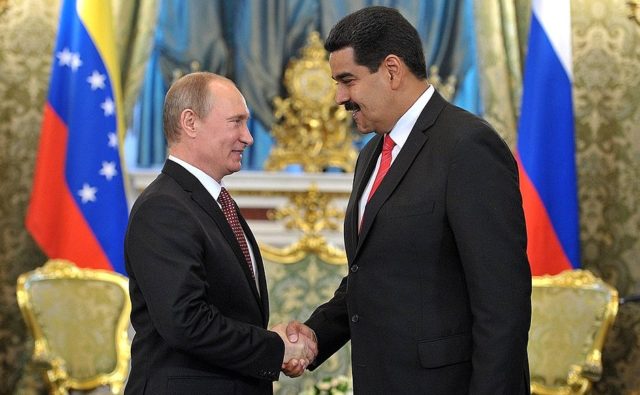
Moscow Continues to Pay Close Attention to Latin America
Publication: Eurasia Daily Monitor Volume: 15 Issue: 19
By:

Russia’s actions in Latin America—including a recent series of economic agreements signed with Argentina (Izvestia, January 18)—are often overlooked given that Europe, Asia, the Middle East and, of course, the United States are widely understood to be much higher foreign policy priorities for Moscow. But that neglect is misconceived. While Latin America is hardly at the top of Russian geostrategic concerns, Moscow is certainly not ignoring potential opportunities there, which the Kremlin views as a way to upset Washington’s global objectives and interests. For that purpose no country is too small. Thus, last fall, Foreign Minister Sergei Lavrov stated that Russia sees Surinam “as a promising partner in Latin America and the Caribbean and seeks to strengthen bilateral economic ties” (Mid.ru, October 31, 2017), a traditional entrée for Moscow into Latin America.
Beyond economic relations, Lavrov equally touted the prospect that Surinam might agree with Russia on the need to use the United Nations to block the United States (though, of course, not Russia) from pursuing unilateral actions on the world stage. Moreover, he sought Surinam’s support in developing relations between Russia and multilateral organizations like the Community of Latin American and Caribbean States (CELAC) and the Caribbean Community (CARICOM) (Mid.ru, October 31, 2017).
Surinam is not unique here. Moscow invokes economic opportunities and consensual views of the UN across the region, in part to gain economic and political access but also to embarrass and weaken the US. Illustratively, in late 2017, Lavrov trotted out the same kinds of arguments about what brings Moscow and Mexico City together in his talks with Mexican Foreign Minister Luis Videgaray Caso (Mid.ru, November 17, 2017).
Likewise, in early 2018, Russian President Vladimir Putin met with his Argentinian counterpart, Mauricio Macri, and the two discussed and signed a number of agreements to further cooperation in economic relations, foreign affairs as well as, notably, defense procurement. The economic side focuses heavily on exploration and production of natural gas and oil as well as renewables, but Putin also offered to sell Argentina Russian rocket engines (Izvestia, January 18). To be sure, the scale of economic ties between Russia and Latin American countries is minuscule compared to Chinese involvement (see China Brief, August 22, 2014; July 21, 2017; November 22, 2017) and what has historically been the case with Europe and the US. But clearly it is targeted at specific spheres like energy and arms sales, where Russia might have a comparative advantage.
Moscow’s recent investments in Venezuela, during late 2017, helped that country stave off default—although it still appears inevitable. Nevertheless, these investments, embodying the classic Russian policy of trading debt for equity (see EDM, May 7, 2014), gave Moscow a strong position inside Venezuela’s energy sector by buying up ownership stakes in local oil fields (see EDM, October 4, 2017). And now that global oil prices have rebounded, Russia will likely use its leverage over Venezuelan energy to feather its own nest and support insurgencies and information wars across Latin America and as well as outside the region.
It is safe to say that Venezuela now depends on Russia for its economic survival and serves Moscow in ways that go beyond Latin America. In November 2017, Russian propaganda outlets RT and Sputnik disseminated a barrage of messages on social media related to Venezuela and the ideas of its late leader Hugo Chavez to launch a withering information attack on Spain in the aftermath of the referendum on Catalonian independence. This online campaign demonstrated how Russian media access in Latin America enables Moscow to obtain the means by which it can wage information war against Spain and other Luso-Hispanic movements and communities in both the Western and Eastern hemispheres (El País, November 11, 2017). Indeed, US officials have recently begun loudly charging that Russia is interfering in Mexico’s upcoming presidential elections (Reforma.com, January 6, 2018).
Moscow continues to build on its earlier forays into Latin America. Current initiatives tend to be built on the lure of arms sales, energy and economic incentives. And in pro-Russian states of the region, like Venezuela, Nicaragua and Cuba, all these instruments of power and policy are being deployed. While security and defense issues are temporarily quiet, we see that Moscow has now expanded its information warfare campaigns in Latin America, and it is quite unlikely that it will confine itself merely to Venezuela or Mexico. In other words, economic negotiations may be only the tip of the iceberg regarding Russia’s ties to Latin America; and underneath, Moscow’s more belligerent and even adventurous gambits could come increasingly into view should an opportunity manifest itself.



